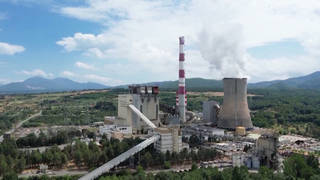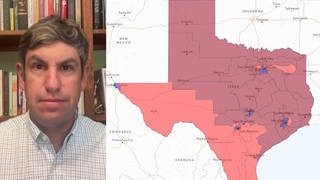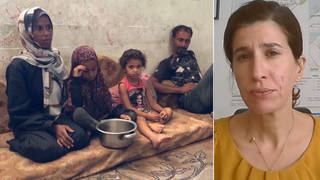
Guests
- Shibley Telhamiprofessor of peace and development at the University of Maryland, senior fellow at the Center for Middle East Policy and co-editor of The One State Reality: What Is Israel/Palestine?
As we continue to cover Israel’s war on Gaza, we speak with Middle East scholar Shibley Telhami, who says this latest violence is likely to have a major impact on the wider region, especially if other actors like Lebanon’s Hezbollah fighters get involved in the conflict. He says U.S. President Joe Biden’s support for Israel following the Hamas attack on Saturday was understandable, but that focus must shift to finding a long-term solution to the Israeli-Palestinian conflict. “This is not a military challenge,” says Telhami. “This is a political problem, and the occupation has to be addressed.”
Transcript
AMY GOODMAN: This is Democracy Now!, democracynow.org. I’m Amy Goodman, with Juan González.
To look at what Israel’s war on Palestinians after the Hamas attack could mean for the broader Middle East, we end today’s show with Shibley Telhami, professor of peace and development at the University of Maryland, senior fellow at the Center for Middle East Policy, co-editor of the book The One State Reality: What Is Israel/Palestine?
Professor Telhami, thank you so much for being with this. You’re the Anwar Sadat professor of peace and development at the University of Maryland, a Palestinian American professor. I’m going to start with that same question: what President Biden has said so far and what you want to hear him say right now? As we speak, the United Nations has called Israel’s siege, total blockade of Gaza, illegal. You know, the defense minister is saying no food, medicine, electricity, water coming into Gaza. Your response?
SHIBLEY TELHAMI: Well, you know, I know in the first day of the Hamas attack, President Biden called the Israeli prime minister and gave him full empathy and support, and he said, “Full stop, we’re behind you.” That’s understandable in that moment. That was a moment of incredible vulnerability in Israel, people helplessly watching what was happening to their loved ones. And it was also a paradigm shift actually taking place at the same time about the nature of their superiority in that context, about the role of their army, the role of their security. So it was understandable that he would show affinity with them, to assure them — really the public more than the government — to say, “We stand with you.” Fine.
But he has to go beyond that. Targeting civilians and recklessly endangering them is unacceptable. It doesn’t matter whether it’s Palestinian victims or Israeli victims or any victims. There is no cause that justifies reckless endangerment of civilians. And, you know, we know in times of war like this, when emotions are really, really high, we understand that people have been there, can understand how hearts harden. There’s demonization. There’s an urge for vengeance. And if the president of the United States, the one who has the most influence from the outside on this issue, doesn’t stand up for the moral principle that ought to be central here, it is a problem. That’s something that a political leader must do in time of crisis like this.
And I would even go a little further than that. You know, it’s one thing to say you support Israel, another thing to be trusting and giving unlimited support for whatever they do. We know this is the most extreme Israeli government we’ve had perhaps in history. We know that some of them are calling for some outrageous outcomes in the Israeli-Palestinian situation. They have failed their own people. They couldn’t defend against Hamas in their own communities, took them several days to — and it might not be over yet. The Israeli public is asking questons of whether they can trust the government, whether they can trust the military, whether they can trust the intelligence. Can we trust them to do the sort of things that they might want to do that implicate us in the end, not just in terms of support, but the consequences that might happen that can draw the U.S. in? So I think I would want the president of the United States to be very clear about the moral issue, as well as the idea that the United States has some interests it’s going to have to look after.
JUAN GONZÁLEZ: And, Professor, I wanted to ask you, in terms of this vow of the Israeli government to eliminate Hamas completely and to do whatever is necessary to take control of Gaza, the long-term implications of this? First of all, there are 2.2 million people in Gaza. The ability of the Israeli army to continue to occupy and control that territory is really — it’s far-fetched, not to mention that there are another 2 million Palestinians in the West Bank and 2 million Palestinians and Arabs within Israel itself. We’re talking about the impact on those populations and the rest of the Arab world of a long assault and occupation of Gaza. Your expectation of what this could lead to?
SHIBLEY TELHAMI: Well, first of all, let’s start with the concept. It is dealt with as if it’s a security problem emanating from one party, when in fact this is a deep political problem. There is no military solution, even if you destroy people and kill more people. Israel has a destructive power that is incredible. I mean, we’re seeing some of that now. But that never in the past has solved the problem, and it won’t again. It might postpone it a little bit more, but it’s going to erupt in some form or another, even aside from the humanitarian disaster. So, no, there is no solution, even if you — separate from the obvious and immediate and central humanitarian issue, there is no political solution that could come out of destroying Hamas. Israel would then be left with another area of anarchy.
And also, by the way, as this progresses, we can’t be sure that Hezbollah is not going to be drawn in. Hezbollah doesn’t want to go in, in my opinion, right now into the fight, for a variety of reasons of its own interests. But we see the pressure. And as the pressure increases, that could draw Hezbollah in. And then you have an expanded war both that would be troublesome for Israel but also for Lebanon.
So, no, I don’t think there is a military solution to this problem. This is not a military challenge. This is not a deterrence challenge. This is a political problem, and the occupation has to be addressed. And I would expect at some point the president isn’t going to say that today. He’s not going to make that link. But in the end, there is — we have to find a path to end the occupation.
AMY GOODMAN: We want to thank you so much for being with us. We want to continue this discussion and post it at democracynow.org. University of Maryland professor of peace and development, Shibley Telhami, senior fellow at the Center for Middle East Policy. I’m Amy Goodman, with Juan González, for another edition of Democracy Now!











Media Options